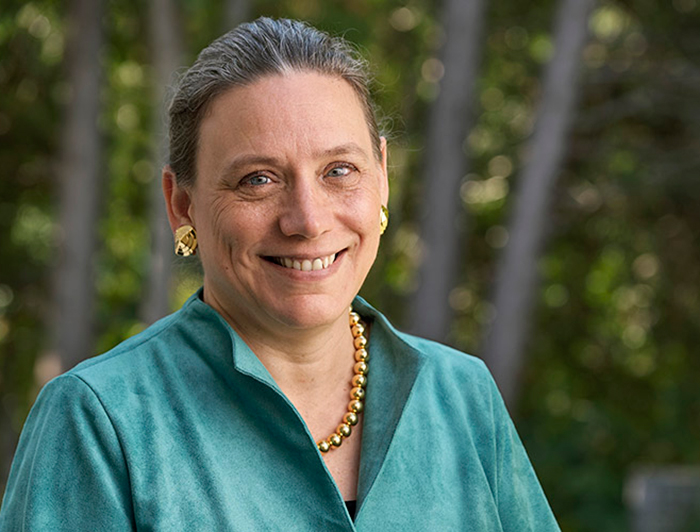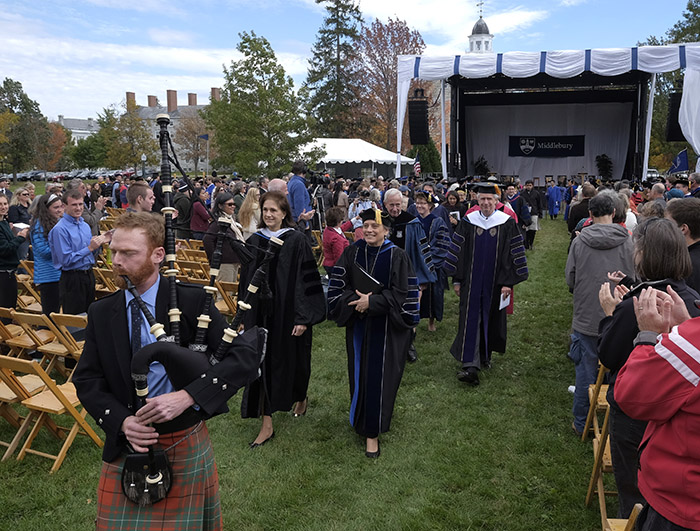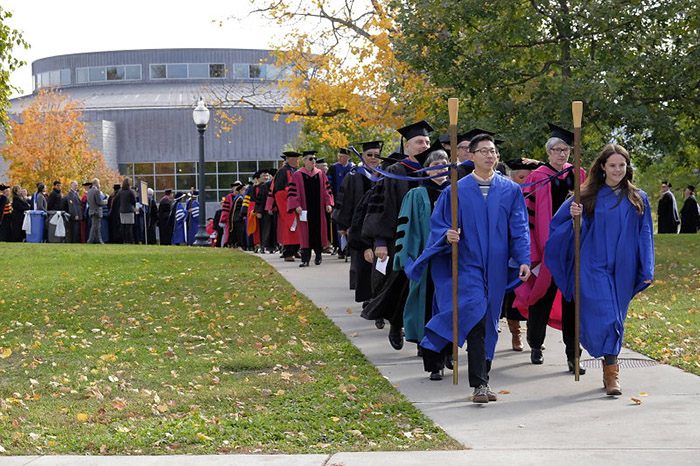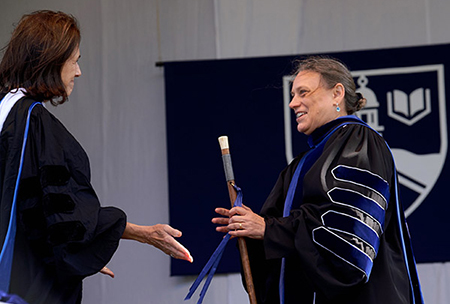Laurie Patton Applies Ancient Wisdom at Middlebury College |
|
| by Amy Brooks Thornton | |
|
|
A few minutes after 10 a.m. on a brilliant fall morning, Laurie Patton swept into her office greeted the tech guys who were fixing her computer, addressed her assistant, then turned to me, the task at hand for the next forty-five minutes before another group demanded her attention. She asked where it would be best to sit, desk or couch? She chose the table near the outlet. Better for me. Straightforward, gracious, without ostentation or false humility, a hint of humor always ready at the corners of her mouth. Laurie Patton, first woman president of Middlebury College. In her inaugural address at Middlebury College this fall, Patton quoted poet Heather McHugh: “If you live on the edge of an enormous mountain or an enormous body of water, it’s harder to think of yourself as being so important.” Then Patton added the last line of McHugh’s poem: “That seems useful to me, spiritually”—words that seem to typify her remarkably approachability. Patton is highly accomplished. First and foremost she is a distinguished religion scholar, teacher, and translator of classic Indian Sanskrit texts. Before Middlebury, she was the dean of Duke University’s Trinity College of Arts and Sciences and the Robert F. Durden Professor of Religion. Patton graduated from Harvard-Radcliffe College in comparative religions, received her master’s from University of Chicago Divinity School, and completed her doctorate on the history of religions at the University of Chicago. She conducted research in India and Israel on two separate Fulbright scholarships as well as in Paris and at Columbia University and is the author of several books, including two volumes of poetry. Patton can read in five languages: Sanskrit, French, Hindi, German, Old Irish, and biblical Hebrew. The contemplative life sustains and feeds Patton’s intense pace; it is the core of her work. Toward this end, she takes time, usually in the early morning, to write. She also meditates using the “insight” tradition or vipassana. Yet for Patton, her practice is not confined to solitude or sitting. In Character Clearinghouse, an online center related to moral development of college students, Patton writes that “contemplation in action” helps her cultivate “contemplative mind while in the midst of a high-speed professional life of minute by minute executive decisions.” That explains a lot. “If you work and are committed to a contemplative practice,” she tells me, “then you’re going to be able to be fully present to whomever you work with and fully present to the tasks that need to be done during the day.
|
|
(inauguration recession) Inauguration of President Patton, October 2015. |
|
 |
|
Poetry, for Patton, is a form of contemplation and she likens the creation of poems to the work of administration—a startling comparison but not atypical for Patton. “Creating unusual connections and building things,” says Patton, “in that way poetry is no different than running a college.” It’s not a huge leap from poetry to her office desk because for Patton administrative work is deeply creative. “If you don’t understand it as creative then…you’re not going to be as good a leader as you need to be.” One of Patton’s academic goals at Middlebury is to integrate disciplines and fields of study. The work of poetry supports that intention. “I have always loved putting things together that don’t naturally have affinities,” Patton explains. “That’s what a good metaphor is, putting an image together that startles people…[disciplines and fields of study] are much, much richer by virtue of coming together…That’s the ancient understanding of knowledge: that math and poetry and science and social science were deeply connected.” In her inaugural address at Middlebury, Patton remarked to representatives from all the disciplines, “Like all great ecosystems, species interdependence and species differentiation go hand in hand.” As college president Patton shoulders the enormous responsibility of leading a community and creating a culture in which each student can achieve transformation through learning, while maintaining healthy and happy lives. Today’s students can find themselves running on empty in a world of high expectations and social pressures while also trying to make every tuition dollar count. Striving for perfect outcomes, they find themselves exhausted and overwhelmed, which can lead to high anxiety, depression, and substance abuse. Students feel “that in each arena of their lives they need to be effortlessly perfect,” Patton says. “How are we creating, in each part of the college environment, expectations that [may not] seem overwhelming in individual spaces but in aggregate can be overwhelming?” Patton is acutely aware that even at Middlebury’s small campus, substance abuse, particularly the nonmedical use of prescription stimulants such as Adderall and Ritalin, need proactive awareness and treatment. The College Life Study from the University of Maryland reports that 31 percent of college students have used or are using nonmedical prescription stimulants. The report finds that these students tend to take higher than prescribed doses, which can lead to “unknown interactions with other drugs, risk for dependence, and... dangerously high body temperatures, irregular heartbeat, seizures, or heart attack.” Typically, the report finds, students take these drugs because they believe it will help them meet academic demands; however, the evidence reveals that these drugs are unlikely to improve academic performance. Patton’s approach is to “design the best conversation” about responsibility, doing better, and not blaming. “Instead of having an argument with a false dichotomy—is it culture or is it the student’s fault, what I call a ‘blame storm’ and doesn’t get anyone anywhere… you need to address three things: root cause, symptoms, culture... and take it upon ourselves to look at all three together and take away that element of blame.” She recalls a story about the Buddha who, when asked why he doesn’t talk about who created the world or who is the source of pain, he replies—in Patton’s words—“If I see someone by the roadside and there’s an arrow in him I’m not going to sit and talk to him about who shot the arrow, I’m going to get the arrow out and get him better.” How does Patton pull the arrow out, heal the wound, and ensure it is never shot in the first place?: resilience, communication, balance of body and mind, culture, and responsibility. Hers is a holistic solution of interdependencies. “It’s what sociologist Mark Thompson calls the ‘clumsy solution,’” Patton says, “several different things at once.” “Resilience isn’t about pushing on and gutting it through,” Patton says, “but rather understanding that if something happens to you, if the worst thing happens to you, you still have the resources and the community, and the support... to go back to shape. Literally that’s what resilience means, returning to shape or creating a new shape that is stronger and different than before.” Resources, community, and support depend heavily on communication, Patton believes. Patton points to Middlebury’s Resilience Project, a resource for students in which students, faculty, and administrators tell stories of their “trials and errors, starts and stops.” The front page expresses the hope “that by sharing how we’ve been knocked down and how we’ve come back stronger, we can both support each other in our struggles and celebrate our strength in the ways we manage to overcome them.” It’s a profound and effective recipe for resilience: community creation and support through authentic, supportive communication. For Patton a healthy outcome also requires attention to the larger question concerning the root cause: “Is there genuine human connection in learning?” In many universities enormous and impersonal student classes rely on teaching assistants to grade students using rigid rubrics to ensure fairness, which leaves little room for experimentation and imperfection. In contrast, a small class size encourages students to take risks intellectually, learn from fellow students, and play with nuances. Fortunately, at Middlebury many classes have 20 or fewer students, and Patton has witnessed the “deep concern” of Middlebury faculty for their students learning process. Middlebury, in 1992, instituted a commons system to foster a closer community of students, faculty, and staff. The five commons or groups of residence halls have a team of scholars and teachers who not only connect personally with students but also serve to provide balance, which is a key part of Patton’s solution. The commons leaders “truly believe that integration of social and athletic and academic life is possible,” Patton says enthusiastically. Patton will also advocate for body-mind balance by working with the athletic department to acknowledge the academic load and with academic departments to give value to physical health including intramural and club sports—“not just varsity sports” Patton says. She wants to intentionally design human connection with other students and faculty into Middlebury’s classroom experience and make room for failure. “Every speech I give I talk about how I screwed up, I talk about the mistake I made yesterday. Not the narrative of, ‘Oh, I came from poverty, or I screwed up in that one way, and then everything was fine after that one colossal failure.’ The narrative is, ‘Here’s what I did yesterday. Here’s what didn’t work this morning. Here’s what I could have said better five days ago or six weeks ago.’” Although much of the culture Patton seeks for her students is already in place at Middlebury, she hopes each person will take responsibility for his or her part in continuing to make Middlebury an intellectually vibrant and healthy campus. “Administrators at all levels need to say if we are creating a culture that feels unmanageable then we need to look at that,” Patton says. Faculty can help by “allowing kids to feel they can make mistakes, be experimental even as they are looking at the job market.” And “students themselves need to take responsibility for managing their own lives.” Although aware that substance abuse may require external support, and with the intention to provide that support, Patton urges her students “to know... when you are in an addictive space and when you are relying on something externally [for] performance, [or] to create an image, when in fact what you need to be doing is creating inner resources to deal with things… rather than depending on an external substance to get you through life.”
|
|
Lead by student marshals Hyeon-Seok Yu and Katherine Hamilton, both juniors, |
|
|
Tackling the highly sensitive and complex national issue of sexual assault on college campuses challenges college and university presidents across the country. Patton’s no exception. The National Sexual Violence Resource Center (NSVRC) reports that 20 to 25 percent of college women and 15 percent of college men are victims of forced sex during their college years, more than 90 percent of sexual assault victims on college campuses do not report the assault, and that 27 percent of women have experienced some form of unwanted sexual conduct. “When you have 18- to 22-year-olds…the pressures of higher education and... substance abuse present, even if there’s all that education and training for students available, it’s still going to be a really difficult thing to manage,” says Patton. Patton looks at the issue both philosophically and pragmatically. “Both men and women need to think about the power of sexuality. It’s something that is, in many ways, still new for young men and women. Figuring out how to use and engage that power responsibly is absolutely essential.” For Patton some of the answer can come from questions raised in the classroom, “What is responsibility? What is the good life? What is the moral life?” Patton’s pragmatic solution includes three approaches. The first is to create a fair, transparent, and well-communicated process of investigation when claims are brought. The second is to hire an independent and experienced investigators and adjudicators trained in Title IX and sexual assault investigations as many higher education institutions are now doing, because, Patton says, “these cases involve such murky evidence and accounts from any number of different players and actors much of which does involve substance abuse.” Title IX of the Education Amendments of 1972 is the federal law that protects all genders from discrimination based on sex in education programs or activities that receive federal financial assistance. The third is to draw on resources from the community. The Washington, DC–based Green Dot program, which trains in bystander observance as well as bystander intervention, is well under way at Middlebury. The green dot refers to each positive action by an educated bystander as "a green dot on the campus map" in contrast to a red dot, which refers to a place where stalking or violence has occurred. Ultimately, Patton believes, “It goes back to student stress. Thinking about creating a campus where health and well-being and resilience are part of the culture is our number-one challenge.”
“Why isn’t it the same burden of choice for men?” Patton asks. “Men never seem to worry about having those two things together. I want men to worry about having those two things together just the way women do.” Patton made those hard choices, becoming successful by most standards while leaving behind other options. When people ask Patton how she “does it all,” she answers: “There’s no magic. I work 24/7. I didn’t have kids. I have a stepson whom I adore. I have nieces whom I adore. And I made very real choices.” “The deepest divide in our culture is this false dichotomy between women who choose the work of child care and women who choose the work of something in the workplace. They both choose work,” Patton says. “The truly difficult and deeply dignified work of creating a home and raising a family... is just as much a career as the work of an NBC producer. If we can’t respect and honor that choice of work, whether it’s by women or by men, then we still have a lot of work to do,” says Patton. “And we still have such a long way to go in making sure that men feel comfortable in that choice of raising a family.” One of the academic avenues Patton hopes to see Middlebury travel is to expand “literate globalism.” “In higher education, every institution is talking about globalism and very few are taking the time to define what that looks like,” Patton says. She defines literate globalism as a process of learning “the institutions, the politics, the languages and the cultures... It doesn’t mean extracting a global experience and then coming back to the United States. It means truly becoming the student of the social institutions, even the scientific cultures, as well as the languages and cultures of civilizations... It’s deeply effective... in business [and] in peacemaking.” “People come [to Middlebury] to learn language and are doing so in order to build peace. You have people coming to learn Arabic because they found themselves to be mediators between two villages in Syria or thinking about how to build better environmental stability in Guatemala and they need better Spanish. That’s the kind of literate globalism I’m talking about.” Patton also hopes add Hindi to Middlebury’s very strong language program. She notes that India has a sixth of the world’s population and feels that “Middlebury could lead in some interesting ways in a Hindi summer school.” |
|
|
Being the first woman president at Middlebury doesn’t faze Patton. “Middlebury was ready to have a woman president 40 years ago. It’s been incredibly easy. The culture is very open. It’s very gender sensitive,” she says. “If anything, I am worried that the expectations are so high partly because the fit between my values and areas of expertise and Middlebury’s strengths is so good.” “I don’t think the other shoe is going to drop in some massively, awful, colossal way. I think we are just going to have some tough arguments and people are going to stay with me. It’s very moving to be part of this community and to have the privilege to be in this role of leadership.” In her inaugural address Patton spoke about the Jewish tradition of the "argument for the sake of heaven." |
|
| “This is an argument worth having,” she said “where the goal is not victory, nor even the proof of one's own intelligence. Rather, the goal has been a deeper truth for the common good. It is an argument where one wants the other side to have better arguments, because all arguments are in service of the common good. We want to learn from the better arguments, so that we can create a better and more capacious home for all of us to dwell in.” |
|
|
Amy Brooks Thornton, a multimedia journalist, is the founder and former president of Pacem School in Montpelier, Vermont.
|



